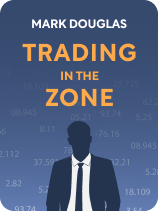

This article is an excerpt from the Shortform book guide to "Trading in the Zone" by Mark Douglas. Shortform has the world's best summaries and analyses of books you should be reading.
Like this article? Sign up for a free trial here .
What is fundamental analysis in trading? Is it possible to predict the market based solely on what fundamental analysis says?
Fundamental analysis predicts what the market will do based solely on what mathematical models say is logical. However, traders’ behavior is far from logical, which is why fundamental analysis alone is not enough to predict what happens in the market.
Here’s why you can’t predict the market based on fundamental analysis alone.
Fundamental Analysis
In trading, fundamental analysis is a method of assessing the value of an investment using mathematical models. These models take into account multiple variables that could affect the relative balance of supply and demand for that particular investment. Variables include interest rates, competitors, weather patterns, employment rates, and financial statements of the company issuing the stock or bond. By analyzing this data, Douglas says, you may be able to make a plausible forecast of what the price should be at some point in the future. If data suggests a price will rise, you could be wise to invest. But, if data indicates a price will fall, you should likely avoid investing.
According to Douglas, a drawback of this type of analysis is that it doesn’t take into account the potential for other traders to affect prices in an unpredictable way. Traders often make decisions based on emotion, not logic, and this irrational trading activity can dramatically influence prices. For example, traders may panic and sell off stocks in a company based on unfounded rumors that the company’s highly successful CEO is going to resign, thereby causing the price of that company’s stocks to plummet. Thus, fundamental analysis can generate clear and compelling price predictions based on supply and demand factors, but those predictions may nonetheless be grossly inaccurate due to non-rational activity by individual traders.
Pros and Cons of Fundamental Analysis
Although Douglas mentions the inability of fundamental analysis to account for traders’ nonrational behavior, he doesn’t elaborate on the many other shortcomings—or, the many advantages—of this method. Here are some pros and cons based on experts’ insights:
Pros:
- Useful for long-term investors—Fundamental analysis looks at earnings, profit margins, and economic performance measures over a period of months or years. If you hold onto your stocks for long time frames, you can use this analysis strategy to identify—and then capitalize on—favorable patterns that play out over time.
- Helpful during panic—When everyone is selling stocks during a panic, fundamentally strong stocks recover quickly whenever the market bounces back. Using fundamental analysis will help you find these hardier stocks.
- Reveals the financial performance and prospects in a whole industry—You can see the market share of one company in relation to competitors and can identify up-and-coming innovators.
Cons:
- Irrelevant for short-term trades—Some economic indicators used in this type of analysis are only released every few days, and company financials are only released quarterly. This is too infrequent to be useful for day traders who must respond to changes minute by minute.
- Time-consuming and tedious—It takes considerable time and effort to conduct a thorough fundamental analysis.
- Cannot account for random events—In A Random Walk Down Wall Street, economist Burton Malkiel notes that random events in the external social and political environment can radically influence prices, including a new legal regime, an environmental emergency, or the development of groundbreaking technology.
- Cannot account for bad actors—Malkiel also points out that firms can fudge the financial reports used in this type of analysis. Furthermore, analysts can produce biased reports that make the stock seem better than it is, possibly due to conflicts of interest resulting from loyalty to their employers’ clients.
Given these varied pros and cons, it’s wise to avoid relying on fundamental analysis exclusively when making trading decisions, as Douglas says.

———End of Preview———
Like what you just read? Read the rest of the world's best book summary and analysis of Mark Douglas's "Trading in the Zone" at Shortform .
Here's what you'll find in our full Trading in the Zone summary :
- The role mindset plays in stock trading
- The critical importance of embracing risk
- How to become a confident, consistent winner







Yes Fundamental analysis helps to predicts the market will do based solely and logically.
You gave an understandable content for fundamental analysis.
Thank you for sharing this blog and I am early waiting for your forward updates.